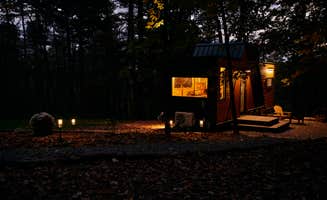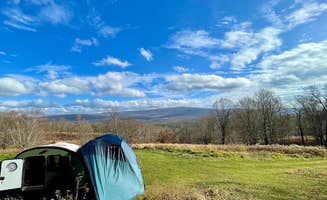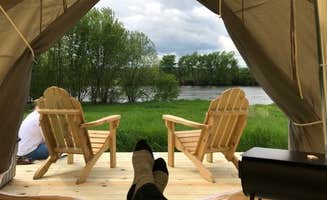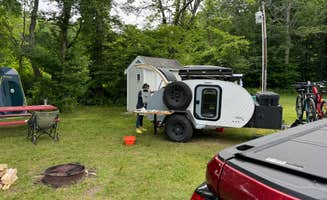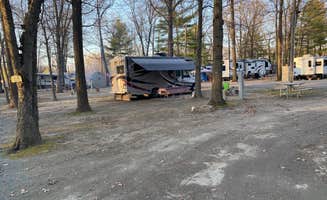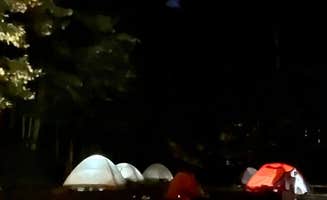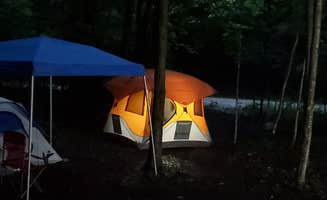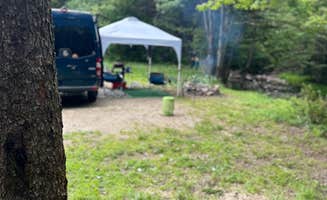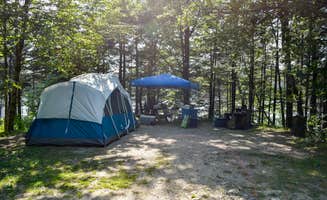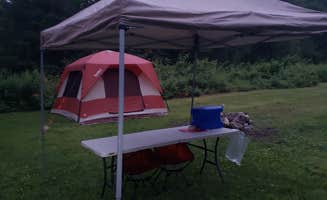Camping near Cambridge, New York offers visitors access to several riverside camping experiences within the Green Mountain region. The Battenkill River creates a natural border between New York and Vermont, providing campers with swimming, fishing, and paddling options across multiple campgrounds. Many sites in this region sit at elevations between 500-1,200 feet, resulting in temperature variations of 10-15 degrees between valley campgrounds and those at higher elevations.
What to do
Trout fishing access: The Battenkill River provides excellent fishing opportunities during camping season. At Camping On The Battenkill, visitors can fish directly from riverfront campsites. "Friends and I camp here every June, and we love being close to the river. We sleep in tents so the sound of the river puts you to sleep at night," notes camper Heather P.
Kayaking and paddling: Many campsites offer direct water access for launching small watercraft. At Emerald Lake State Park Campground, campers can explore a small lake perfect for beginning paddlers. "The lake was beautiful and rented boats and canoes. Swimming is also available," reports Debbi B., highlighting the rental options for those without their own equipment.
Mountain hiking: Several campgrounds provide access to nearby trail networks. Woodford State Park connects to multiple hiking paths with wildlife viewing opportunities. "We heard coyotes at night and loons in the morning," notes Melissa S., describing the natural soundscape at this higher elevation campground.
What campers like
Riverfront camping: Sites along the Battenkill River receive consistently high ratings from visitors. "We were at site 17, and it was a massive site. Lots of room would be great for a large family or group. The beach on the river is beautiful and clean! Easy swimming for all," mentions Christina M. about her experience at Camping On The Battenkill.
Pond swimming: Several campgrounds feature small ponds that warm up faster than river water. "Great little campground close to Albany. We needed a place to stop for the night but could have stayed all weekend. There is a small pond that is fun to fish and swim in," reports Erin O. about Pine Hollow Campground.
Lean-to options: Some Vermont state parks offer covered lean-to structures as an alternative to tent camping. "We had a lean to site at this campground. Facilities were great," shares Debbi B. about her stay at Emerald Lake. These structures provide protection from unexpected rain while maintaining an outdoor camping experience.
What you should know
Seasonal operation limitations: Most campgrounds in the region operate from May through mid-October due to weather patterns. "We camped here with our dog on a tent site in camping area B. I really appreciated the VT state parks interactive campground map, which allowed us to see the sites from home and choose the one that would suit us best," explains Cynthia K. about her planning process for Woodford State Park Campground.
Dispersed camping conditions: For those seeking more remote options, free dispersed camping is available but requires preparation. "Peaceful and quiet dispersed camping spot. Large enough for 2-3 vehicles or one large rig/RV. Very few vehicles pass, some days none," reports Danny D. about dispersed camping in the National Forest.
Elevation considerations: Campgrounds at higher elevations experience significantly cooler nighttime temperatures, even in summer. The temperature difference can reach 15°F cooler at night compared to valley campgrounds, requiring extra layers for sleeping comfort.
Tips for camping with families
Swimming accessibility: When camping with children, consider proximity to swimming areas and whether they're suitable for various ages. "The pond in the middle with fishing and a dock" makes Pine Hollow Campground particularly appealing according to David R., who appreciated this feature with his family.
Kid-friendly activities: Some campgrounds specifically cater to families with organized weekend events. "My family and I have been camping here for 40 years. 4 of my 5 children learned to ride their bikes on the circle that surrounds the playground," shares David M. about his multi-generational experiences at Camping On The Battenkill.
Site selection strategy: For families, choosing the right site location can significantly impact your experience. "If you have little ones, check out the map before you reserve a site and find one on the opposite side of the ledge," advises one camper about selecting family-appropriate sites at Emerald Lake State Park.
Tips from RVers
Site access considerations: RVers should research site dimensions before booking. At Moreau Lake State Park Campground, Nancy W. notes, "The road to our campsite was paved and in good shape but there were a few tight spots because of the trees that make it tricky for a big rig. Loop A seems to be the best for big-rigs."
Full hookup availability: While many campgrounds offer electric and water, full hookups are limited. "We had our small camper on a tent site to be near the river. Some sites were right on the river, many larger RVs were closer to an open play area/field. There were hookups and dump station," reports Monica F., highlighting the tradeoff between riverfront access and hookup availability.
Parking configurations: Some campgrounds require specific approaches to parking larger vehicles. "We were unable to get onto it with our travel trailer because of the tight parameters in which to maneuver. We were, however, able to level-up on the gravel drive next to it," explains Connie C. about navigating her RV at a smaller campground.


